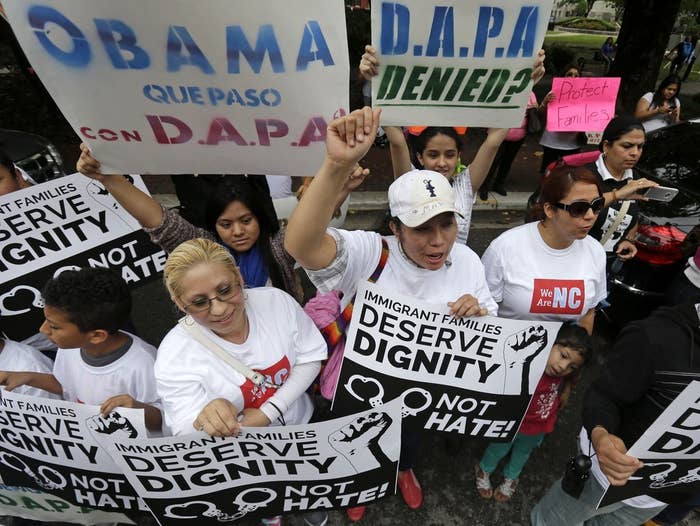
NEW ORLEANS — A federal appeals court heard arguments Friday over President Obama's plan to defer the deportation of potentially millions of undocumented immigrants, leaving the plan on hold at least until it rules.
As the three-judge panel of the 5th Circuit Court of Appeals questioned the Texas and Justice Department lawyers Friday morning, hundreds of immigrants and their supporters held a raucous Second Line parade outside the courthouse that repeatedly interrupted the proceedings.
A district court judge in Texas this winter halted implementation of Obama's 2014 Deferred Action for Parents of Americans executive order, which would have provided deportation waivers for certain undocumented workers if they meet specific criteria.
The three-judge panel did not rule on the administration's argument that the case —brought by Texas and more than two dozen other states — should be dismissed because they lacked standing to sue, or on the underlying question of whether the administration had the authority to implement the new plan, and the court did not say when a decision will be released.
While it is unclear how the court will rule, Judge Carolyn Dineen King appeared sympathetic to the administration's arguments, particularly on the underlying legality of DAPA, repeatedly pressing Texas Solicitor General Scott Keller over the issue of work permits, which is at the center of the conservative complaints about the order.
Although Keller acknowledged there are a handful of specific instances in statutory language in which the Department of Homeland Security can provide work permits to recipients of a deportation deferment, King repeatedly and pointedly asked whether states see any discretionary authority. At one point as Keller seemed to dodge answering King head on, the judge said "I understand the state doesn't want that to happen … you don't want [undocumented immigrants] to be able to get work permits" before throwing up her hands, forcing Keller to concede her point.
Judge Jennifer Elrod, however, remained clearly skeptical of the administration's legal authority. Picking up the states' argument that the White House is conferring a legal status on the undocumented, Principal Deputy Assistant Attorney General Benjamin Mizer struggled to answer her repeated questions about where the authority lies for the administration to declare them lawfully in the United States.
Elrod's skepticism was somewhat predictable, as she and Judge Jerry Smith — who also heard today's oral arguments — rejected a DOJ request to lift the stay on implementing DAPA that was based on largely the same arguments. As in the hearing on that motion, Smith remained largely inscrutable, asking only a handful of questions during the more than two hour-long hearing.
Meanwhile, the Supreme Court's recent redistricting ruling could impact the DAPA case. The states pointed to the high court's ruling that the Arizona legislature had standing to sue the independent redistricting commission to bolster their standing claim, which is at the heart of the early legal wrangling over the policy.
Throughout the course of the legal challenge to Obama's executive action, both sides have asserted that the expect an eventual victory. But so far the Obama administration and its supporters have been dealt only losses, first by Judge Andrew Hanen in the district court in Brownsville and then by a 5th Circuit panel that, like the one today, was dominated by conservative judges.
In the meantime, the federal government has stopped preparing to unroll the programs, and some immigrant advocates have begun to worry that the legal challenge may succeed — if not by winning in the courts, then at least by running out the clock. "I was looking at the timeline, and it hit me even harder," Julio Zuniga, president of the Arizona Dream Act Coalition, told BuzzFeed News in June. "The longest the appeal could go might be over a year. So that means that elections are going to pass, and that means that with a new president, the executive order could be stopped or eliminated."
In turn, the opponents of Obama's actions have grown emboldened. "On the merits, this case is a slam dunk for the plaintiffs," Kris Kobach, the Kansas secretary of state and a leading opponent of Obama's immigration policies, told BuzzFeed News. "I think many attorneys in the Justice Department realize what a difficult legal case they have."
From the beginning of the challenge, immigrant advocates have blamed these setbacks on what they call "venue-shopping," saying Texas and its fellow plaintiffs specifically chose Judge Hanen's district and the 5th Circuit for its predominantly conservative judges. John Wittman, a spokesperson for Texas Governor Greg Abbott, countered that the case may have also landed with a Clinton-appointed judge in the same court, and that the court's location made it a suitable venue. "The lawsuit was appropriately filed in Brownsville, Texas, as it was the epicenter of border crossings following Obama's executive order," Wittman said.
Still, some advocates were heartened by Judge King's aggressive questioning of the plaintiffs on whether they were motivated by a desire to prevent undocumented immigrants from obtaining work permits.
"Some of the questions that were raised in court today really brought to light what we think is the crux of the matter," said Karen Tumlin, managing attorney for the Los Angeles office the National Immigration Law Center. "Do we want to be a country that includes people or excludes them?"

